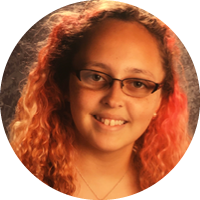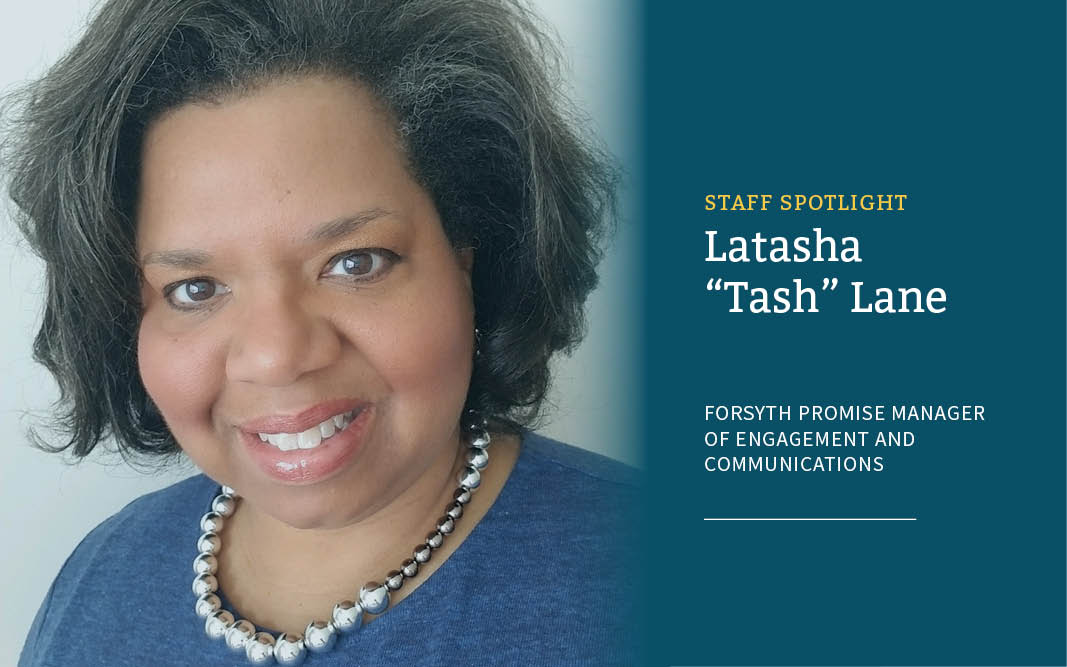
by Aurora Fulp
AmeriCorps VISTA Member, The Forsyth Promise

Latasha (Tash) Lane recently took time from her busy schedule to tell us a bit about herself and her history with The Forsyth Promise.
What inspired you to work in the nonprofit sector? How did you get involved with TFP?
I’ve done volunteer work since I was in high school. I got as high as a national volunteer with March of Dimes, and I worked through my sorority Zeta Phi Beta with recruitment, awareness, and fundraising. As a top leader for six years and national co-director, we raised upwards of about $3.5 million. I really enjoyed that opportunity to fundraise and connect with researchers who are doing the work in infant and maternal health, and carry that mission centered perspective into the work I do with The Forsyth Promise and United Way. What The Forsyth Promise offers is the ability to merge and to incorporate early childhood education and K-12 with my higher education experiences into one, which was very attractive for me.
In the fall of 2015 a dear sorority sister and friend of mine let me know about a position that she felt I would excel at, a position as a network facilitator for The Forsyth Promise. I looked up the position and liked what I read, I was really excited about the possibilities of working in nonprofit. I attended one of the collaborative action network meetings, enjoyed what I witnessed, talked with few more folks. I was offered a position and I started December 1, 2015. So I thank my sister friend Kanesha Coleman, for thinking of me for the job because someone had thought that she’d be good for it but she said, “I know someone who will be better.”
How would you characterize your role at TFP?
Today, that would be the point of contact with organizations, but also offering an historical perspective on what the organization is all about, making sure those connections stay fresh and that we bring in folks who may be may not have heard of the Forsyth Promise. Being a leader, being a convener, definitely being connected and connecting folks with the work. Being a coach through the Data Sharing Project. Being an advocate for the work and for folks who are in the trenches, and for our children, and also being a catalyst to help build bridges.
What are some important ways that The Forsyth Promise has evolved over time?
The launch of The Forsyth Promise was to address some educational gaps that existed in our community in Forsyth County, and because of the passion and opportunity that existed for folks to convene and to gather to discuss this common situation, to be focused on a resolution that really drove people together. The concept of what an organization would be like for our local community brought the presentation of StriveTogether as a baseline for introducing what a cradle-to-career network could be for Forsyth County. And from there, the development of The Forsyth Promise happened, and here we are several years later, still helping to address and recognize, and hopefully alleviate some of the educational gaps that exist for children and students in Forsyth County. So we have a rather short, but substantial history because people were drawn together by this common need, this common awareness of what needs to happen in our community.
How does The Forsyth Promise work to bring in these community members to get them focused in on these issues?
I think it happens various ways. We’ve always had larger community events where it’s an open invitation to anyone in our community who’s interested in the topic at hand. We call them now Be the Change events. They typically happen every quarter, though COVID brought around a few changes as far as scheduling. At those events, it allows people to hear a little bit about TFP and a specific topic and then participate in the call to action, where people can be then looped into some regular work through action networks. As the term signifies, it’s about taking action, making an action plan to identify what next steps to take to address an educational outcome.
From there we have the action teams, and an action team that’s been very active lately is the infant and toddler action team. This group is peer led, and they determine what issues and what opportunities exist to address and they’ve done an excellent job of helping people learn a little bit about approaches to advocacy work with our government and legislators.
We have our newsletter to get engaged with what’s happening on a monthly basis with TFP, and get a little snapshot of who we serve, talking about the Data Sharing Project and its agencies and partners, information about those folks who support the partnership, from our executive leaders to some other folks in the community.
We have an executive level involvement of our Executive Advisory Board, made up of folks across our community in different sectors: higher education, K 12/early childhood education, business, nonprofit, government, philanthropy, faith. Those voices represent entities that have a viable interest in education across the cradle to career spectrum that give direction and insight to the programmatic features and strategic planning elements of TFP.
On a more personal note, what is your favorite part of what you do?
I have so many. One element I like is definitely dealing with people. One of the initiatives that TFP brought to Forsyth County was this frog called Ready Freddy, a kindergarten readiness initiative to help families prepare their young people to transition to kindergarten. That was phenomenal in many regards, there was interaction with funders, they were very excited about the possibility of this initiative being in Forsyth County with the track record it has across the country. Then the conversation with educators about the opportunities that a Ready Freddy initiative could bring for their kids.
I was actually in the costume many times and got a chance to interact with them as Ready Freddy. I got to talk with parents on a one-on-one basis outside the costume and interact with folks at the different schools along the way, speaking with other supporters. Now it’s live in the school district and they’ve done an excellent job of taking it to the next level.
I love interacting with individuals who are engaged in initiatives like Ready Freddy and getting them energized and excited about education, and raising awareness on those educational issues that might not be prevalent for someone who may not have children or their children may have graduated from high school. It’s really nice to engage in conversations with all these levels of folks, because listening to their perspective and kind of bouncing my energy off of that has been phenomenal.
What is your proudest moment so far, working with The Forsyth Promise?
Well, I will say, working on Ready Freddy. The action team was under the Kindergarten Readiness Collaborative Action Network at the time, and working with those professionals, it was just incredible to see them take the lead and take ownership of the work, and their enthusiasm was consistent. They organized, they coordinated meetings, they did the research. We even got a chance to share that at a national conference with folks who talk about these things on a regular basis as far as what this work means and what collective impact does.
What’s the main thing that you would want somebody to know about what The Forsyth Promise is up to right now?
I’ll echo something that one of our co-chairs on our Executive Advisory Board said, “stay tuned”. We’re in the process of launching our Community Education report, and I encourage people to do a little historical preview of what those reports look like, they’re available on our website. I especially like for folks to look at last year’s report, because it’s the first time that we’ve done an all-digital report, it is very interactive. It contains a lot of good information, a lot of great and personalized stories of lived experiences. I encourage folks to take a look at that, have conversations about the data that you see, ask questions, bring in information to your communities to launch the conversations about what these issues in our wider community.
Was there anything else that you would like to add?
I really appreciate the opportunity to continue the work. I thank the Executive Advisory Board members, past and present for their leadership or their foundation for their vision. I also thank United Way of Forsyth County and its board for giving us a solid backbone support.
We look forward to adding additional folks to the table. We invite parents, students, caregivers, advocates, administrators to get connected to TFP, to bring their ideas and thoughts to how this work can really make an impact to our on our community.
